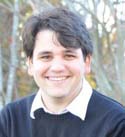
By Madison Ferril
Reporter
A sociology professor from Baylor and his colleague from the University of Texas in San Antonio have found that children whose parents were both religious at the time of divorce were more likely to move away from organized religion if the parent with custody did not remarry.
Baylor’s Dr. Jeremy Uecker and Dr. Christopher Ellison of UT- San Antonio argue against previous studies which state that children of single parents are more likely to move away from religion than those with two parents, or that the effect of divorce on religious affiliation is overstated.
Uecker, in conjunction with Ellison, published a paper in December that seeks to answer the question of whether divorce shapes a child’s religious views later in life. The paper, titled “Parental Divorce, Parental Religious Characteristics, and Religious Outcomes in Adulthood,” was published in the Journal for the Scientific Study of Religion.
Uecker said he worked on the research on and off for the past couple of years. He was invited to attend a conference called “Does the Shape of Families Shape Faith?” where he presented the initial draft of the paper.
“There have been studies on this subject before,” Uecker said. “But these studies did not take the religious views of both parents into account. We wanted to give more information about the religious context of kids growing up.”
Ellison said he worked on three previous papers on the topic of religion and divorce.
“You seem to learn a lot more about those relationships through looking at the background of both parents,” Ellison said. “All of that suggests that the religious background of the parents should be incorporated into the background of the child.”
The research used data from three sets of General Social Surveys of people over the age of 18. GSS are personal interview surveys done by the National Opinion Research Center designed to gauge changes in social characteristics and attitudes. Uecker and Ellison restricted their pool to three years; 1991, 1998, and 2008.
According to the study, this shows the religious views of both parents play a role in the religious views of the child later on in life. The current United States divorce rate is about 3.5 divorces per 1,000 marriages, according to the 2013 World Almanac
“We didn’t really see this effect in families where a step-parent came in,” Uecker said. “A step-parent made it more likely that a child would change affiliation, though.”
Uecker said this is due to the fact that a stepparent often introduces their own religious beliefs to their step-children.
Though divorce still increases the chances of a child moving away from religion, if the child ends up in the custody of the more religious parent, they are less likely to move away from religious belief.
“Most religious change happens during adolescence or young adulthood,” Uecker said. “By the time they become adults, get married, and have kids, their beliefs are pretty much set.”
Uecker said his main research interests are how religion shapes family and parenting and the transition to adulthood. His previous research includes a book on the sexual habits of college students.
Uecker said that he came to Baylor because Baylor has a strong Sociology of Religion faculty and program.
“It’s an attractive place for me intellectually,” Uecker said. “They have good resources, a friendly environment, and the faculty is interested in the kinds of things I’m interested in.”
Ellison said his primary research interests are the interactions between faith and society and the interactions between ethnicity, race, and religion.




